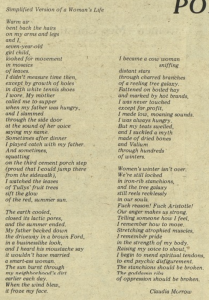
A poem, “Simplified Version of a Woman’s Life,” by Claudia Morrow, published in the May 1975 issue of Her-self. The poem details how a woman’s evolving relationship with a benzodiazepine, Valium, affects her autonomy.
Published in the initial issue of the fourth volume of Her-Self, the poem “Simplified Version of a Woman’s Life” by Claudia Morrow tells a story of a young girl transformed into an object to be married with the help of Valium. In the first stanza, the narrator reminisces about the freedom of childhood through vibrant imagery, “look[ing] for movement / in mosaics / of leaves” and “watch[ing] the leaves / of Tullys’ fruit trees / sift the glow / of the red, summer sun” (Morrow 18). Through her awareness and observations of the world, the narrator is free. Transitioning into the second stanza, the narrator matures into adulthood and the world becomes harsher: her father says he “wouldn’t have married a smart-ass woman,” implying that the narrator needs to outgrow her freedom and become suitable for marriage while “the earth cool[s], [and] close[s] its lactic pores” (18). The misogynistic portrayal of the narrator as a commodity to be married renders the narrator a “cow woman,” and her body a dowry (18). Through an extended bovine metaphor, the narrator is “fattened on boiled hay” and forced to “suckle a myth / of dried bones / and Valium” (18). In other words, she is prepared for marriage, and is unable to observe the world, or maintain agency within her circumstances, as a result of having been sedated. The final stanza begins with the lines, “Women’s winter isn’t over. We’re still locked / in iron-rib stanchions” referencing both the shackles of prescription tranquilizers and the greater oppression of women (18). The poem ends on a powerful message of hope, as the narrator gradually comes out of her docile state, “remember[ing] how to move,” “stretching atrophied muscles,” and “mend[ing] spiritual tendons” (18). In this final stanza, the narrator rediscovers her will to fight the oppression that was prescribed, both by her doctor and patriarchal society. Ultimately, she avoids the more dire fate of Anne Sexton’s narrator in “The Addict” – perhaps, in part, thanks to the personal narratives, poetry, visual imagery, and relevant research that warned against tranquilizer abuse in second-wave feminist publications.
Work Cited:
Morrow, Claudia. “Simplified Version of a Woman’s Life.” Her-self, vol. 4, no. 1, May 1975, p. 18. JSTOR, www.jstor.org/stable/community.28038351.
